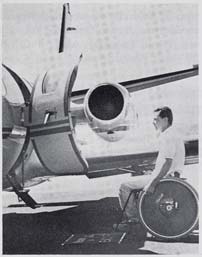

There is a growing affinity between air travel and the disabled population. On one hand, air transportation has become a necessity for any disabled person desiring to lead an active and productive life. More specifically, for disabled individuals participating in national and international sport competition, air transportation has become imperative. On the other hand, the disabled consumer is also becoming a larger segment of the tourism industry. Disabled persons are sightseeing, vacationing, visiting, and involved with such leisure attractions as theme and national parks, national historical sites, resorts, and cruises.
Many disabled individuals have a story or two to tell about airline experiences. One such story appeared in an Associated Press article this year. Officials of one of our major U.S. airlines apologized to a disabled passenger after airline employees put him on a baggage dolly, verbally abused him in front of passengers, and treated him so roughly that at one point his slacks came off when moving him from one location to another in the plane. This situation occurred even though special arrangements had been made by the passenger prior to the trip.
In 1988, the Consumer Affairs Office within the Department of Transportation (DOT) received just 164 such complaints involving disabled passengers out of 24,000 total complaints (.68%). However, David Capozzi, National Advocacy Director for the Paralyzed Veterans of America recently noted that, "The DOT numbers do not represent the calls and letters received at the local level by national and regional airlines. Furthermore, the numbers game confuses the real issue which is freedom to travel. Travel should be considered an essential civil right for all citizens."
In the book entitled A Guide for the Disabled Traveler (1984), Francis Barish explains that a great amount of legislation was passed in the 1970's pertaining to accessibility rights for the disabled. However, this legislation involved use of federal funds for programs and facilities. Airlines have generally remained untouched by federal government regulations.
Recently, Robert Ashby, General Counsel for Regulations and Enforcement within DOT indicated that, "It is often difficult for the disabled to know from one airline to the next, or even from one terminal or flight crew to the next, what conditions will be imposed." Despite the dismal past, disabled travelers have reason for renewed hope. In the not-too-distant future, all U.S. airlines will be expected to establish, maintain, and communicate policies and procedures pertaining to air travel for disabled individuals. In October of 1986, Congress enacted the Air Carrier Access Act (ACAA) to amend the Federal Aviation Act of 1958. The ACAA prohibits discrimination on the basis of handicap by all U. S. air carriers.
The ACAA regulatory negotiations between various disability groups and the air travel industry have agreed to rules, which when inacted, will hopefully communicate consistant and acceptable policies of air travel for disabled passengers. The regulations will not permit carriers to:
The rules also contain provisions for dogs and other service animals, exit row seating, on-board wheelchairs, accessible lavatories, moveable aisle armrests, and training of airline personnel.
Each airline will be required to have a Complaints Resolution Official (CRO) available at each airport or by phone. The CROs will attempt to resolve problems with disabled passengers without DOT involvement. The CROs will have authority to correct their airline's error on the spot. Disabled passengers will also be able to refer their complaints to the DOT if it is not resolved at the local level.
Historically, airline policies and practices pertaining to disabled passengers have been controversial, intrusive, and discriminatory. To help prevent future trepidations and annoyances, all disabled individuals and professionals who work with disabled persons should be thoroughly familiar with the ACAA.
Ultimately, key questions remain. Will the Act enable airlines to provide safe, efficient, cost effective service for all passengers? Does the ACAA address the major air travel ISSUES for disabled passengers? Will the Act provide predictability and consistency for disabled persons? What will be the major short and long term effect of the ACAA?